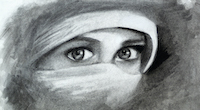Thursday 28th November 2024

One of the programmes I really love dipping in to is Who Do You Think You are? Various well-known people are guided through their family tree by historians, archivists and family members. There are invariably surprises along the way. The family member who was imprisoned for embezzlement, or the great grandmother who had a child out of wedlock that no one knew about. In Olivia Colman’s episode they trace her Great, Great Grandmother to a woman called Harriet Slessor, who is found to have had an Indian mother. She says:
‘Her grandson is my mum’s grandad, which means we’ve touched each others hands throughout time’.
I love the idea of touching hands through history.
Matthew’s gospel begins in a way many people would find incredibly dull. It’s a genealogy, detailing 40 generations back to Abraham. Within the list of names are five women: Tamar, Rahab, Ruth, Bathsheba (wife of Uriah), and Mary – each touching hands through history to Jesus, and then to us.
Their stories are complex, messy, confusing, and on occasion distressing. But each story is very human, and, in the way of the Old Testament, we get humanity in all its muck as well as glory. Many commentators note that the stories of these women are surprising to be within the line of Jesus. One dresses as a prostitute, one is a prostitute, two are outsiders to the Jewish faith, one is accused of adultery.
But perhaps these are just the kind of women who would be in the lineage of Jesus, who was accused of spending time with the ‘wrong kind of people’ throughout life. People rather like Tamar, Rahab, Ruth and Bathsheba.
So, to Tamar. It’s a strange story.
She was the daughter in law of Judah, who you will remember was one of the sons of Jacob. He had three sons – Er, Onan and Shelah.
First Tamar was married to Er, and he died. Then, according to custom, she was married to Er’s brother, Onan. He also died after refusing to have children with her. Judah, understandably perhaps, is reluctant for her to marry his youngest third son, Shelah, and so tells her to go back to her father’s house and promises to send for her when Shelah is older.
He doesn’t fulfil this promise. A childless widow was vulnerable and likely to end hungry and homeless. And so Tamar takes matters into her own hands. She wears a veil to disguise herself, and sees Shelah all grown up and realises Judah’s promise hasn’t been kept.
This must have been a place where the prostitutes sit because, thinking she was a prostitute, Judah propositions her. They have sex and he leaves his seal and cord as a pledge in leu of payment.
Judah is furious when he finds out his daughter in law is pregnant – This reflects badly on him. He brings her out to be publicly killed.
She produces the items which prove his hypocrisy and complicity, and he repents: ‘She is more in the right than I’ (v.26)
In Advent we look towards the light whilst sitting in the darkness. There is much in our world that is still not right.
Tamar’s story is both ancient, but also horribly current. She reminds us of women who have no power or control over their lives. We remember the countless women today who take desperate and extreme measures to keep themselves alive in a culture where the odds are stacked against them.
Tamar had to wear a veil to obscure her identity. How many women in Afghanistan are today forced to cover themselves against their will, and become less than fully human?
We look in expectation and hope to Jesus who came into the world and redeems that which has been broken and damaged. When we understand the stories of the Old Testament, we better understand the stories of the new.
There are echoes with another nativity, where a child is conceived to an unwed mother is circumstances many found to be suspicious. And echoes with another woman in another town, who was paraded in front of a religious teacher and accused of immorality and threatened with death – John 8. 1-11:
Teacher, this woman was caught in the act of adultery. 5 The law of Moses says to stone her. What do you say?”
Did Jesus have Tamar in mind I wonder?
“All right, but let the one who has never sinned throw the first stone!”
The crowd, like Judah before them, slink away knowing their own sin.
End with a poem
TAMAR by Janet Wilkes (not printed for copyright reasons).
As we remember Tamar, let us pray:
- For those whose lives are a mess and for whom nothing works out the way they hope
- For those who have to take matters into their own hands, even if it puts them at risk
- For those who judge, and those who realise their wrong doing.
Next Advent Reflection – Thursday 5th December at 6.15pm – Rahab
